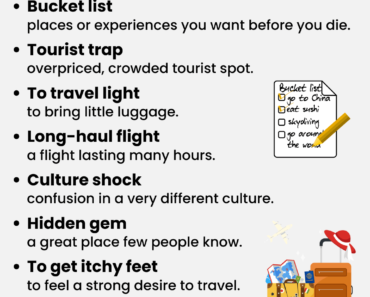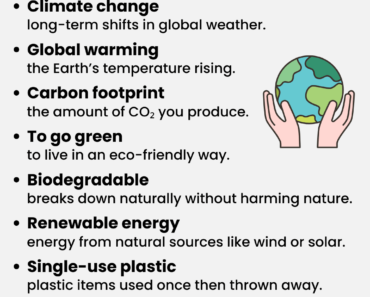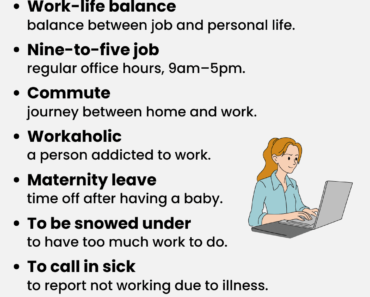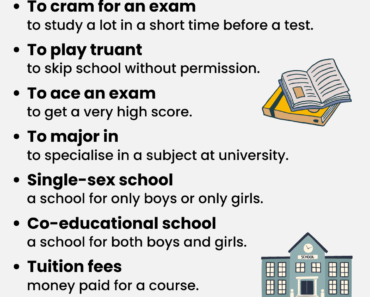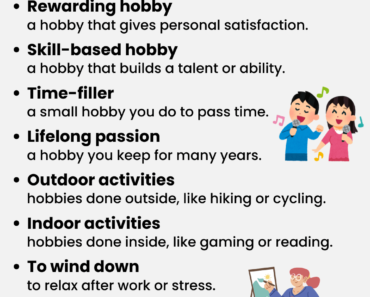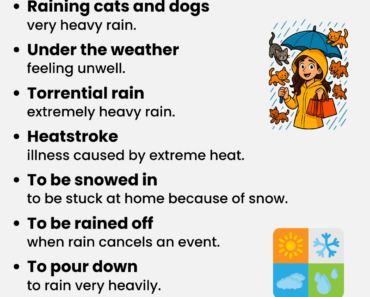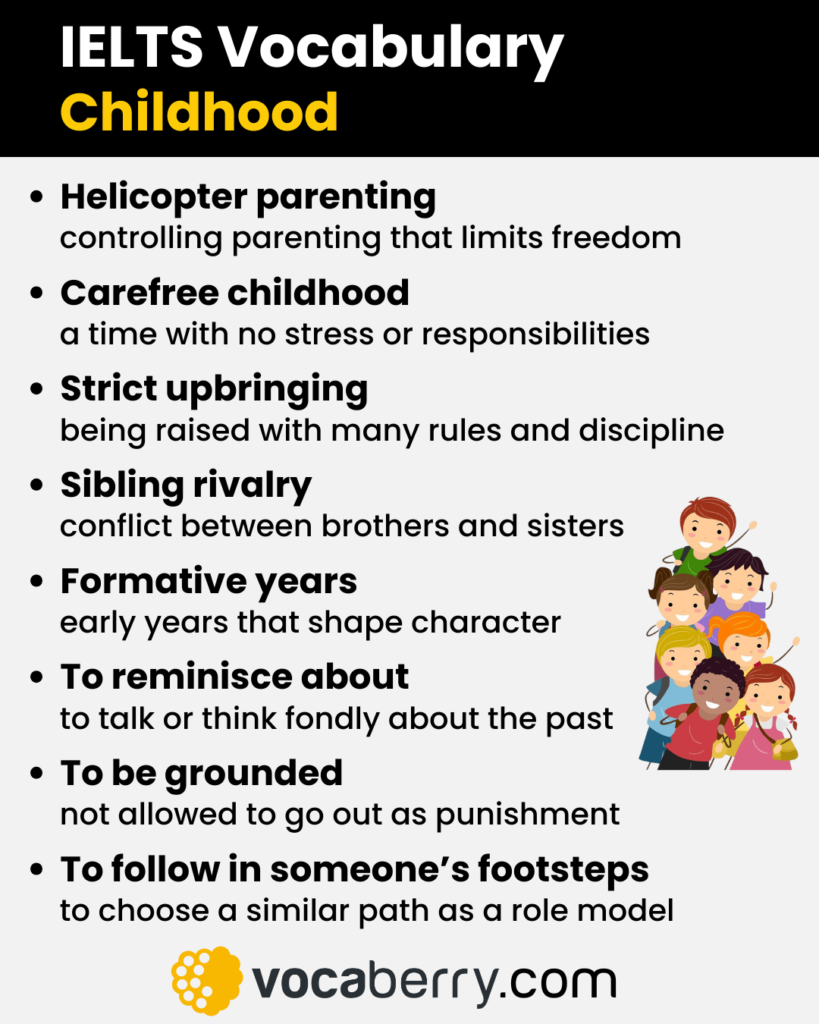
Childhood is a common topic in the IELTS Speaking test. Examiners may ask you about your early memories, favorite childhood activities, or how childhood experiences shape people’s lives. In this guide, you’ll learn useful IELTS vocabulary for childhood with clear definitions, followed by IELTS Speaking Part 1, Part 2, and Part 3 questions with sample answers.
IELTS Vocabulary for Childhood
Here is some useful IELTS vocabulary for talking about childhood with clear definitions. These words and phrases will help you give better answers in the IELTS Speaking test.
- Childhood – the period of being a child.
- Upbringing – the way a child is raised.
- Nursery school – a school for very young children.
- Primary school – the first years of formal education.
- Teenager – a person aged between 13 and 19.
- Adolescence – the stage between childhood and adulthood.
- Role model – a person you admire and want to be like.
- Family bond – the strong connection between family members.
- Sibling rivalry – competition between brothers and sisters.
- Childhood friend – someone you were friends with as a child.
- Childhood dream – a goal or ambition from early life.
- Childhood memory – something remembered from early life.
- Childhood trauma – emotional pain caused by negative childhood experiences.
- Imaginative play – pretending to be someone or something else.
- Generation gap – differences in opinions or lifestyle between young and old people.
- Carefree childhood – a time without worries or responsibilities.
- Strict upbringing – being raised with many rules and limits.
- Helicopter parenting – over-involved parenting that limits independence.
- Overprotective parents – parents who worry too much about their children.
- Formative years – the early years when a child’s character is developed.
- Parental guidance – help and advice given by parents.
- Sheltered childhood – a childhood protected from negative experiences.
- Childlike innocence – the natural purity and honesty of children.
- Milestone – a significant stage in a child’s development.
- Flooding back – suddenly remembered very clearly.
- A spoiled brat – a child who behaves badly because of too much attention or gifts.
- Quality time – meaningful time spent with loved ones.
- Play-based learning – learning through playing activities.
- Child neglect – failing to care properly for a child.
- Stable upbringing – being raised in a safe and supportive environment.
- Latchkey kid – a child who is often home alone because parents are at work.
- Early childhood education – teaching and care for children before formal school.
- To grow up – to develop from a child to an adult.
- To bring up – to raise or care for a child.
- To have a happy childhood – to enjoy a positive and loving early life.
- To have a troubled childhood – to grow up in difficult conditions.
- To make childhood memories – to create experiences remembered from youth.
- To play hide and seek – a children’s game of hiding and finding.
- To recall childhood memories – to think back to experiences as a child.
- To go on school trips – to travel with classmates for learning or fun.
- To be close to – to have a good relationship with someone.
- To spend quality time – to enjoy meaningful moments with family or friends.
- To tell bedtime stories – to read or tell stories to children before sleep.
- To look after younger siblings – to take care of brothers or sisters.
- To develop social skills – to learn how to interact with others.
- To have strict parents – to be raised under many rules.
- To be well-behaved – to act politely and follow rules.
- To be naughty – to behave badly, often in a playful way.
- To be spoiled – to have too many things or too much attention.
- To get into trouble – to do something wrong and be punished.
- To reminisce about – to talk or think happily about the past.
- To keep in touch – to continue communicating with old friends.
- To drift apart – to slowly lose connection over time.
- To raise a child – to take care of and educate a child.
- To instill values – to teach children morals and principles.
- To rebel against authority – to resist rules or parental control.
- To be grounded – to be punished by not being allowed to go out.
- To throw a tantrum – to have an uncontrolled outburst of anger.
- To act out – to show emotions through disruptive behavior.
- To have fond memories of – to remember something positively.
- To outgrow toys – to stop being interested in childhood things.
- To look back on one’s childhood – to reflect on early life experiences.
- To be a handful – to be difficult to manage (used for mischievous children).
- To look up to someone – to admire someone, especially older family members.
- To be raised in a stable home – to grow up in a safe, supportive environment.
- To follow in someone’s footsteps – to take the same path as a role model.
IELTS Speaking: Childhood Questions & Answers
In this section, you’ll find IELTS Speaking Part 1, Part 2, and Part 3 questions on childhood with sample answers. These examples show how the childhood-related vocabulary can be used in your responses during the test.
IELTS Speaking Part 1 – Childhood
Did you enjoy your childhood?
Yes, I had a truly amazing and carefree childhood. I was lucky to grow up in a warm environment filled with quality time, laughter, and a lot of freedom to explore. Looking back, those early years were incredibly special to me.
Who took care of you when you were a child?
Mainly my parents. I was raised in a stable home, and they gave me strong parental guidance throughout my formative years. My mum especially was very nurturing and made sure I never felt neglected or alone.
What do you remember most from your childhood?
One childhood memory that always comes flooding back is playing in the backyard with my cousins. We made up stories and engaged in hours of imaginative play, which sparked my creativity and made those moments unforgettable.
Did you get along well with your siblings?
Yes, although we had our fair share of sibling rivalry, we were also incredibly close. Our family bond grew stronger with time, especially because we shared so many experiences and learned how to look after younger siblings.
Did you ever get into trouble at school?
A few times, yes. I wasn’t a bad kid, but I could be a handful. I remember once being grounded for talking back to a teacher. My parents had a strict upbringing style, so I quickly learned to behave.
Who did you admire when you were young?
I really looked up to my dad. He was my role model, always calm and hardworking. I’ve always tried to follow in his footsteps, and his influence definitely helped shape who I am today.
IELTS Speaking Part 2 – Childhood Cue Card
Describe a memory from your childhood that left a strong impression on you.
You should say:
- what the memory was
- when and where it happened
- who was involved
- and explain why it left such a lasting impression.
Sample Answer:
One vivid memory from my childhood that left a strong impact on me was a family trip we took when I was around eight. It wasn’t anything extravagant, just a weekend getaway to a lakeside park, but it has stayed with me because it truly captured the essence of a happy childhood.
I grew up in a stable home with very loving parents who valued quality time over material things. On this particular trip, they packed our favourite snacks, and we drove out early in the morning. My brother and I were full of energy, laughing, playing, and even having a bit of sibling rivalry over who could climb the biggest tree. Looking back now, I think moments like these helped us build a deep family bond.
What stands out most was how my parents gave us the freedom to explore, but always with parental guidance and care. My dad told us bedtime stories by the campfire, and my mum gently encouraged us to develop social skills by talking to other kids at the park. That kind of play-based learning really shaped my personality more than any formal lesson ever did.
I also remember how safe and cared for I felt. There were no distractions, no screens, just the four of us enjoying a carefree day. That memory often comes flooding back, especially when I’m stressed. It reminds me how important it is to disconnect and be present.
To this day, I try to look back on my childhood with gratitude. I was never spoiled, but I had enough, and the values my parents tried to instill in us during those formative years have stayed with me. I really hope that in the future, I’ll be able to follow in their footsteps and create the same kind of meaningful memories for my own children.
IELTS Speaking Part 3 – Childhood Discussion
IELTS Speaking Part 3 questions about childhood often ask you to compare past and present childhoods, explore how early experiences shape personality, and give opinions on parenting, early education, and the impact of technology on children.
How has childhood changed compared to the past?
Childhood today is almost unrecognizable compared to a few decades ago. In the past, children enjoyed a more carefree childhood, spending time outside, playing games like hide and seek, and learning through imaginative play. These days, children are often surrounded by technology, which limits outdoor activities and face-to-face interaction. Parents tend to be more cautious, sometimes even overprotective, which creates a more controlled and less spontaneous environment. Also, traditional values seem to have shifted, which has widened the generation gap between kids and their parents.
Do you think childhood experiences shape a person’s future?
Definitely. What we experience during our formative years often leaves a lasting mark on who we become as adults. For example, a child who is raised in a stable home with strong parental guidance is likely to develop confidence and empathy. Small but meaningful habits, like spending quality time together or telling bedtime stories, help build emotional security. Even to look after younger siblings teaches responsibility at a young age. These early influences shape values, behavior, and even career paths in many cases.
Should children be allowed to make their own choices?
To some extent, yes. Allowing children to make age-appropriate choices helps them become more independent and boosts their confidence. However, there still needs to be clear parental guidance, especially during the formative years. If kids are given too much freedom without boundaries, they may get into trouble or become a spoiled brat. A healthy balance between freedom and structure allows children to develop social skills, understand consequences, and grow into responsible adults.
Why do some people remember their childhood more clearly than others?
It usually depends on the emotional intensity of those early experiences. People who had a very happy childhood or went through a troubled childhood tend to recall childhood memories more vividly because they’re tied to strong emotions. For instance, a family trip, a personal milestone, or a moment of childhood trauma can all leave deep impressions. I also think people who reflect a lot on their past and regularly reminisce about or talk to others about their childhood tend to retain more detailed memories over time.
More IELTS Vocabulary Topics
If you found this lesson useful, explore other IELTS Speaking topics to expand your vocabulary and practice with sample answers:
- IELTS Vocabulary: Accommodation
- IELTS Vocabulary: Advertisement
- IELTS Vocabulary: Animals
- IELTS Vocabulary: Art
- IELTS Vocabulary: Artificial Intelligence
- IELTS Vocabulary: Books
- IELTS Vocabulary: Crime and Punishment
- IELTS Vocabulary: Culture and Traditions
- IELTS Vocabulary: Daily Routine
- IELTS Vocabulary: Education
- IELTS Vocabulary: Environment
- IELTS Vocabulary: Family
- IELTS Vocabulary: Fashion and Clothes
- IELTS Vocabulary: Films
- IELTS Vocabulary: Food & Diet
- IELTS Vocabulary: Friends
- IELTS Vocabulary: Gifts
- IELTS Vocabulary: Health
- IELTS Vocabulary: Hobbies
- IELTS Vocabulary: Hometown
- IELTS Vocabulary: Money
- IELTS Vocabulary: Museums
- IELTS Vocabulary: Music
- IELTS Vocabulary: Plants
- IELTS Vocabulary: Shopping
- IELTS Vocabulary: Social Media
- IELTS Vocabulary: Sports
- IELTS Vocabulary: Technology
- IELTS Vocabulary: Transport
- IELTS Vocabulary: Travel
- IELTS Vocabulary: Weather
- IELTS Vocabulary: Work & Jobs

